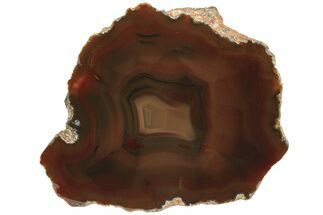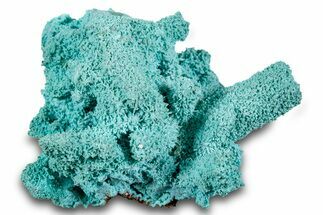This Specimen has been sold.
1.95" Vibrant Red-Orange Botryogen Formation - Argentina
This is a 1.95" wide, vibrant red-orange botryogen specimen. It was collected from the Santa Elena mine in Argentina, a classic locality for this mineral. Botryogen is a hydrous magnesium sulfate mineral that is synonymous with quetenite.
Comes with an acrylic display case.
Comes with an acrylic display case.
About Botryogen
Botryogen is an uncommon and visually captivating mineral that belongs to the sulfate mineral group, admired for its vibrant, bright orange to deep reddish-brown hues. Its name is derived from the Greek word botrys, meaning "bunch of grapes," which aptly describes its unique, rounded, botryoidal (grape-like) crystal formations. This characteristic shape and color make botryogen especially appealing to mineral collectors and enthusiasts. The mineral has a vitreous to resinous luster, giving it a glossy, almost waxy appearance that further enhances its striking visual appeal.
Botryogen typically forms in arid, highly oxidizing environments as a secondary mineral in the weathered, oxidized zones of metal ore deposits, especially those rich in iron and magnesium. In these settings, it often occurs in close association with other sulfate minerals such as melanterite, copiapite, and halotrichite, creating fascinating mineral assemblages. The formation process of botryogen involves the alteration of primary minerals as they interact with oxygen and water in the atmosphere, leading to unique chemical and structural changes that produce this colorful mineral.
Botryogen is an uncommon and visually captivating mineral that belongs to the sulfate mineral group, admired for its vibrant, bright orange to deep reddish-brown hues. Its name is derived from the Greek word botrys, meaning "bunch of grapes," which aptly describes its unique, rounded, botryoidal (grape-like) crystal formations. This characteristic shape and color make botryogen especially appealing to mineral collectors and enthusiasts. The mineral has a vitreous to resinous luster, giving it a glossy, almost waxy appearance that further enhances its striking visual appeal.
Botryogen typically forms in arid, highly oxidizing environments as a secondary mineral in the weathered, oxidized zones of metal ore deposits, especially those rich in iron and magnesium. In these settings, it often occurs in close association with other sulfate minerals such as melanterite, copiapite, and halotrichite, creating fascinating mineral assemblages. The formation process of botryogen involves the alteration of primary minerals as they interact with oxygen and water in the atmosphere, leading to unique chemical and structural changes that produce this colorful mineral.
SPECIES
Botryogen
LOCATION
Santa Elena Mine, Quebrada Alcaparrosa, Calingasta, San Juan Province, Argentina
SIZE
1.95" wide
CATEGORY
ITEM
#305566
 Reviews
Reviews












